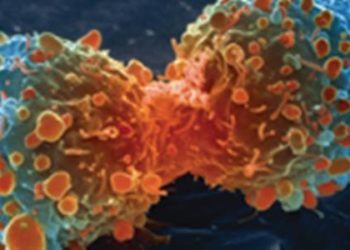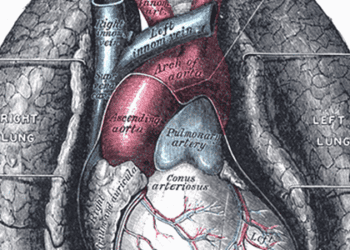Many lung cancers visible on prior imaging studies
1. Among patients with known lung cancer, evidence of malignancy was frequently present but undiagnosed on prior chest computed tomography (CT) scans obtained for the purposes of lung cancer screening.
2. In the present study, all malignant lung nodules that were visible on prior scans represented early, stage I tumors, while those that had appeared between screening exams tended to be more aggressive in stage and histology.
Evidence Rating Level: 3 (Average)
Study Rundown: Given the recent publication of guidelines recommending annual CT screening for lung cancer in adults with a significant smoking history, an evaluation of the diagnostic accuracy of screening CT and potential sources of error was undertaken by the International Early Lung Cancer Action Program. The present study compared chest CT images of patients with confirmed lung cancer to images from prior chest CT studies obtained during routine lung cancer screening with the goal of quantifying the rate at which cancers were previously visible but undiagnosed. Those lesions that were present on prior imaging but remained unidentified tended to be either of a similar size to pulmonary vascular markings or below the clinical detectability threshold of 3 mm in greatest dimension. Tumors not present on prior imaging represented the most aggressive cancers and were likely small, potentially below the resolving power of a standard screening CT scan. Superior identification of missed lesions may have been attained through the use of computer assisted segmentation for nodule detection and the use of maximum intensity projections in routine screening. Misclassification of lesions may have been prevented by publication of more thoroughly standardized features to distinguish suspicious lesions, underscoring a need for future systematic study. Limitations of the study included the use of expert consensus of three radiologists in determining the absence or presence of a lesion on prior examinations rather than a more objective method, the use of variable CT slice thickness parameters between patients, and a relatively small sample size given the broad and heterogeneous topic of population screening.
Click to read the study in the American Journal of Roentgenology
Relevant Reading: Lung cancer screening (JAMA)
In-Depth [retrospective cohort]: This multi-center study examined the CT scans of 104 patients with a diagnosis of lung cancer in whom a negative screening chest CT scan was available one year prior to a malignancy being identified. Three radiologists reviewed all prior negative studies to determine if a precursor lesion was present, and if so, if it was missed on initial reading or misinterpreted as a non-malignant nodule. No prior nodule was identified in 24 of 104 (23%) patients, and 71% of these patients were subsequently found to have stage I disease. Additionally, only 29% of these patients were diagnosed with adenocarcinoma versus 14% and 12% among patients with missed or misinterpreted lesions (p = 0.01), respectively. This group also contained the largest portion of small cell carcinomas at 29% (p = 0.12). All patients with a previously-identifiable lung nodule had stage I disease at the initial examination. Failure to report a nodule on the initial examination occurred in 56 of 104 (54%) patients, while the remaining 24 patients (23%) had lesions that were misinterpreted as non-malignant. The relative growth rate of nodules among patients with missed or misclassified lesions was significantly slower than those with negative initial exams (P < 0.0001) based on average nodule diameters.
More from this author: Intravenous contrast may not increase risk of acute kidney injury, Improved diagnosis of incidental adrenal masses by dual-energy CT, Image-guided biopsy of indeterminate ovarian masses appears safe and effective, Improved diagnosis of incidental adrenal masses by dual-energy CT
Image: PD
©2012-2014 2minutemedicine.com. All rights reserved. No works may be reproduced without expressed written consent from 2minutemedicine.com. Disclaimer: We present factual information directly from peer reviewed medical journals. No post should be construed as medical advice and is not intended as such by the authors, editors, staff or by 2minutemedicine.com. PLEASE SEE A HEALTHCARE PROVIDER IN YOUR AREA IF YOU SEEK MEDICAL ADVICE OF ANY SORT.




![Mepolizumab reduces exacerbations in severe eosinophilic asthma [MENSA trial]](https://www.2minutemedicine.com/wp-content/uploads/2014/09/800px-Inhaler-75x75.jpg)

